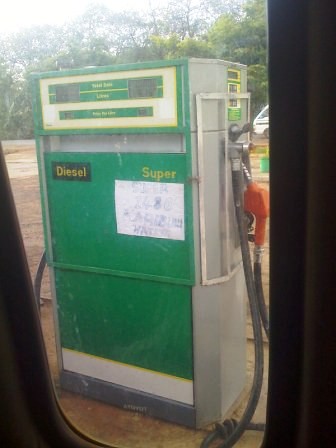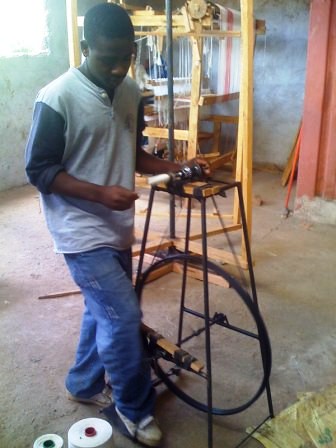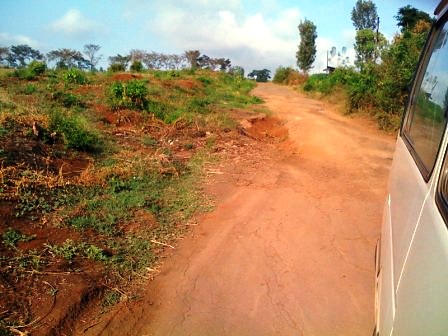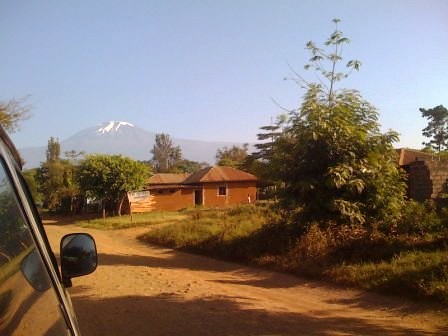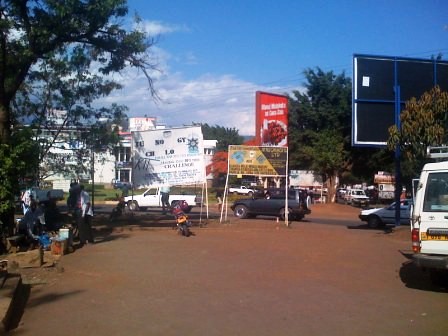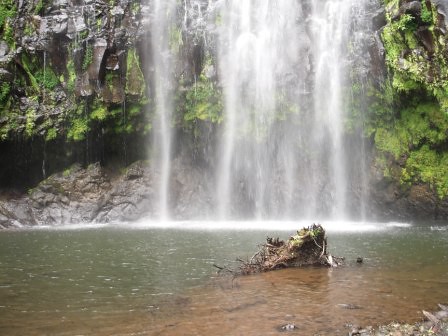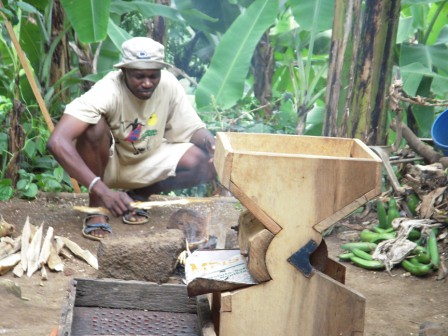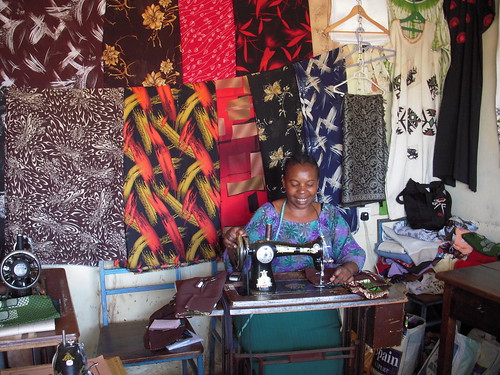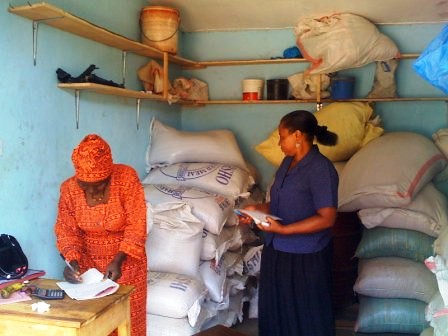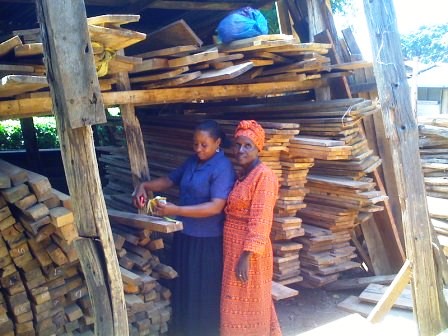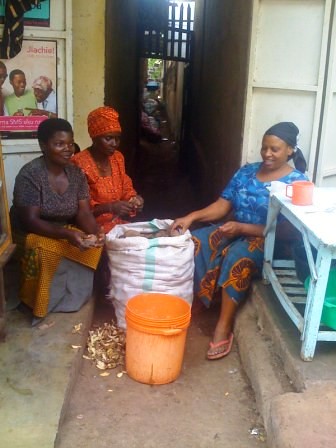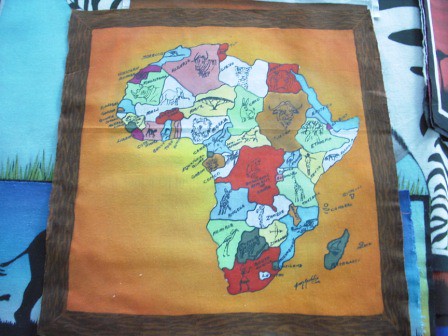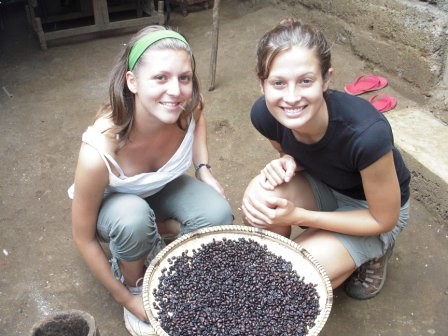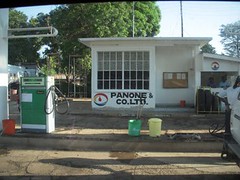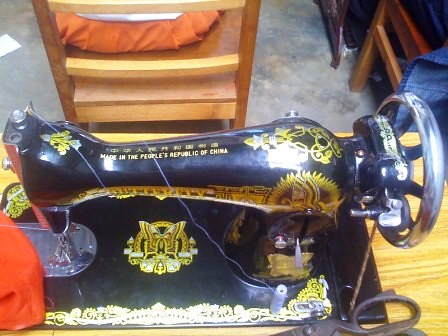
Dec 19 was my last day in Moshi. This final week was really different from the first 3 weeks. At WEECE, Mama mrema came back in town and basically asked me to drop the schedule. I have yet to post case studies from Week 2 and 3, but I promise I will.
I help her write more letters and work in the office at the beginning of my final week. Her major project right now is getting a clinic in Nganjoni village built. Writing and editing for her is a challenge but I'm glad we're making progress. The Canadian Embassy has promised the project a grant but they need the approval of the district commisioner of Moshi. So we visit him at his office, along with TSF (terre sans frontiers), another NGO that is doing the project in conjuction with WEECE. He gives us his blessings, and then we move on to the Executive District Commissioner of Moshi, and Moshi Rural for a formal letter. When we walk into the office there, surprise! The Executive District Commisioner is a woman! The District comissioner says to me, you see, Gender Equity. We have, here in Moshi, heh heh. She is my boss. I get asked how long I've been here, how much swahili I know. I mumble a few words. Mama Mrema asks me when the hell am I going to really learn swahili? I say "Kesho" and she bursts out laughing. (Kesho means tomorrow, oh yeah, of course I'm terrible at learning new languages.)
On Wednesday, I'm join Mama Mrema for office work in the morning, then a visit to the Regional Commissioner of Kilimanjaro's office. This guy is a big honcho; he's almost like a governor and reports to the Prime Minister. The number of UN cars in the compound certainly shows. Our caravan moves to the Mkombozi vocational school where he is given a tour, to see what progress they have made. He is also invited to address graduation. I get a lucky chance to talk to him. When I say USA - He mentions that he has two children and he sent them to Tennessee to go to college. There is more than just a graduation ceremony; Mama Mrema is on the school board and gets to sit on the stage. Its a really long ceremony that goes on for 5 hrs!! It is scorching hot outside. I am about to die. Things are disorganized but organized. In the middle of the ceremony; people just wander about, speeches are going on simultaneously, followed by dance performances, the grads just wander around getting on their gowns. Little kids float. A truck backs its way into the ceremony between the stage and the grads and unloads furniture. Some guy rides his motorcycle partly into the ceremony then realizes halfway that something is actually going on? Um, that wouldn't happen in the US, would it?
My final two days I spent with Janine where we visit her placement with TAFCOM. I've been curious to know what is going on with this organization. What they do with the volunteers is bring them to homes with HIV/AIDS patients. They have projects where they try to provide assistance to low income families with HIV/AIDS. Of the two days, we visit about 3 homes each in the Pasua area of Moshi. This area is poor, rent for a 1 room house is about 5000-8000 TSH per month. Divide that by 1330 to get USD. Many people have no income or depend on their working children for income. Others are employed part of the year as coffee workers. Their immune systems are compromised so many cannot perform hard labor and nutrition is at a minimum. Many also do not have education beyond primary school. It's not clear to me how this organization is trying to accomplish assistance. They claim to have a plan to teach people skills so that they can sustain their daily needs and nutrition needs as HIV patients, but we weren't able to find or see a concrete proposal or budget for this. One of their plans is to teach local people mushroom growing as a source of income and nutrition. Mushroom growing is successful in Arusha and Mbeya, but if you look at the climate, both of these areas are lush, damp and green. To grow mushrooms successfully you need damp, humid dark soil consistently, unless you have the means to control for the environment artificially. This is a far stretch from Pasua. Pasua is extremely dry, hot, and while sometimes humid, the earth does not lie. It is barren. One hour north, toward Mt. Kili you have lush green, humid, tropical, and coffee trees grow there. But put a plot of land in Pasua and expect to get a mushroom project working within reasonable cost - I really question that. Large scale mushroom cultivation, as I know of it from the view of commercial purchaser is not simple, or straightforward in the USA. It takes skill. Small scale is different but if this is for income generation, it sounds like its going to generate terrible margins. Also we hear that many of the volunteers come here and give food and money to the families but it seems to defeat the purpose of the organization's goals because they want volunteers to adopt and sponsor families. We're not sure how this is really sustainable. It is also very difficult, to get straight answers out of the patients and the NGO workers. They do translate, but it can be hard for them to get answers because some issues are taboo and the means of asking is very roundabout - for example, I can't ask - what's the most pressing issue for her family right now?
I hate to sound like a cynic but this is my opinion and I only saw the people and organization briefly, so the skepticism may be unfounded.
I wish I could stay for another week. But sadly I have to leave because I am going on safari on Saturday. I leave Moshi friday afternoon and take a cab to Arusha. With the amount of luggage, I was told it would be safer to do this instead of dalla dalla. The house manager, Baba Fulgence asks me for a lift. No worries, I say.
On the way to Arusha, we can see many many houses that are half finished. I ask why. Unlike my asumptions, it's not because the people are too poor to finish them. There is a land grab - as the population grows, people want to buy land for their children so they have a place to settle. However, the government will take the land back if there is no house on the land. So people compensate by buildling half a house, and leaving it there until their children are ready to take it.
Unlike Moshi, Arusha is lush and green. You see more Mzungu cows. (cows that are like USA cows without the humps on their back). Baba says that the Mzungu cows are stupid and need hormones and lots of grass to prop them up or else they can't survive in this climate. They also need to be tied to the trees by the road because they are so stupid they don't know how to get out of the way when the cars come charging at them. The native cows here are skinny and have humps to store fat - fuel for a drought. They can also walk long distances without food; bottom line, they're adaptable to the harsh climate.
I meet Michelle in Arusha for our safari. She will be volunteering with CCS in January and we are traveling the next two weeks before her placement starts.
We do the tourist thing 4 days in Ngorongoro, Lake Manyara and the Serengeti. The animals were great. We even saw a cheetah eating lunch. I think what shocked me most was the ecology and how fast it changed from region to region. Hot, cold, dry, damp, moist all within a space of an hours drive. Oh, and we were visited by water buffalo outside our tents in the middle of the night chomping away at the grass. So Loud. Gosh the chewing was louder than their hoofs.
I don't like to plan things to the minute; especially here in a place where nothing is guaranteed to run on time. So the basic plan is to visit Rwanda, Uganda and back to Moshi in a circle. Originally I was going to take a peek at Nairobi, but I don't think we will have time.
I'm writing this post from Kigali on Christmas Day.
Yes, that's Rwanda, you read that right. No, its not scary. My travel partner, Michelle and I will be visiting the Genocide Memorials in a day or so.
Internet here in Kigali is really expensive, at 8USD/hr - actually everything in Kigali is much pricier than Tanzania. The exchange rate is about 535 KFranc to 1 USD. The actual prices are comparable to US prices for goods and services.
Rwanda is land of a thousand hills. And from the air, it is really clear. It's rolling hills up and down. We took a 2 hr flight from Kilimanjaro airport to get here in a propeller plane. The airport is really tiny in Kili, but. I had a knife in my carry on and already checked in my bags but they still let me go back and put my knife into my checked luggage.
Boarding is off the tarmac, which is really cool. I feel like we went back in time or something to the 1940s. The ride was bumpy due to the crosswinds but we made it safely there. Unlike what all the travel advisories say, there is no entry visa or payment for US citizens entering Kigali.
People here actually speak English fluently unlike what we expected. We were ready to start speaking french, if needed. Quality of streets here are a lot better, but I cannot compare with Tanzania because this is the capital city of Rwanda. I haven't been to Dar es Salaam yet.
Till next time, Happy Christmas.
I help her write more letters and work in the office at the beginning of my final week. Her major project right now is getting a clinic in Nganjoni village built. Writing and editing for her is a challenge but I'm glad we're making progress. The Canadian Embassy has promised the project a grant but they need the approval of the district commisioner of Moshi. So we visit him at his office, along with TSF (terre sans frontiers), another NGO that is doing the project in conjuction with WEECE. He gives us his blessings, and then we move on to the Executive District Commissioner of Moshi, and Moshi Rural for a formal letter. When we walk into the office there, surprise! The Executive District Commisioner is a woman! The District comissioner says to me, you see, Gender Equity. We have, here in Moshi, heh heh. She is my boss. I get asked how long I've been here, how much swahili I know. I mumble a few words. Mama Mrema asks me when the hell am I going to really learn swahili? I say "Kesho" and she bursts out laughing. (Kesho means tomorrow, oh yeah, of course I'm terrible at learning new languages.)
On Wednesday, I'm join Mama Mrema for office work in the morning, then a visit to the Regional Commissioner of Kilimanjaro's office. This guy is a big honcho; he's almost like a governor and reports to the Prime Minister. The number of UN cars in the compound certainly shows. Our caravan moves to the Mkombozi vocational school where he is given a tour, to see what progress they have made. He is also invited to address graduation. I get a lucky chance to talk to him. When I say USA - He mentions that he has two children and he sent them to Tennessee to go to college. There is more than just a graduation ceremony; Mama Mrema is on the school board and gets to sit on the stage. Its a really long ceremony that goes on for 5 hrs!! It is scorching hot outside. I am about to die. Things are disorganized but organized. In the middle of the ceremony; people just wander about, speeches are going on simultaneously, followed by dance performances, the grads just wander around getting on their gowns. Little kids float. A truck backs its way into the ceremony between the stage and the grads and unloads furniture. Some guy rides his motorcycle partly into the ceremony then realizes halfway that something is actually going on? Um, that wouldn't happen in the US, would it?
My final two days I spent with Janine where we visit her placement with TAFCOM. I've been curious to know what is going on with this organization. What they do with the volunteers is bring them to homes with HIV/AIDS patients. They have projects where they try to provide assistance to low income families with HIV/AIDS. Of the two days, we visit about 3 homes each in the Pasua area of Moshi. This area is poor, rent for a 1 room house is about 5000-8000 TSH per month. Divide that by 1330 to get USD. Many people have no income or depend on their working children for income. Others are employed part of the year as coffee workers. Their immune systems are compromised so many cannot perform hard labor and nutrition is at a minimum. Many also do not have education beyond primary school. It's not clear to me how this organization is trying to accomplish assistance. They claim to have a plan to teach people skills so that they can sustain their daily needs and nutrition needs as HIV patients, but we weren't able to find or see a concrete proposal or budget for this. One of their plans is to teach local people mushroom growing as a source of income and nutrition. Mushroom growing is successful in Arusha and Mbeya, but if you look at the climate, both of these areas are lush, damp and green. To grow mushrooms successfully you need damp, humid dark soil consistently, unless you have the means to control for the environment artificially. This is a far stretch from Pasua. Pasua is extremely dry, hot, and while sometimes humid, the earth does not lie. It is barren. One hour north, toward Mt. Kili you have lush green, humid, tropical, and coffee trees grow there. But put a plot of land in Pasua and expect to get a mushroom project working within reasonable cost - I really question that. Large scale mushroom cultivation, as I know of it from the view of commercial purchaser is not simple, or straightforward in the USA. It takes skill. Small scale is different but if this is for income generation, it sounds like its going to generate terrible margins. Also we hear that many of the volunteers come here and give food and money to the families but it seems to defeat the purpose of the organization's goals because they want volunteers to adopt and sponsor families. We're not sure how this is really sustainable. It is also very difficult, to get straight answers out of the patients and the NGO workers. They do translate, but it can be hard for them to get answers because some issues are taboo and the means of asking is very roundabout - for example, I can't ask - what's the most pressing issue for her family right now?
I hate to sound like a cynic but this is my opinion and I only saw the people and organization briefly, so the skepticism may be unfounded.
I wish I could stay for another week. But sadly I have to leave because I am going on safari on Saturday. I leave Moshi friday afternoon and take a cab to Arusha. With the amount of luggage, I was told it would be safer to do this instead of dalla dalla. The house manager, Baba Fulgence asks me for a lift. No worries, I say.
On the way to Arusha, we can see many many houses that are half finished. I ask why. Unlike my asumptions, it's not because the people are too poor to finish them. There is a land grab - as the population grows, people want to buy land for their children so they have a place to settle. However, the government will take the land back if there is no house on the land. So people compensate by buildling half a house, and leaving it there until their children are ready to take it.
Unlike Moshi, Arusha is lush and green. You see more Mzungu cows. (cows that are like USA cows without the humps on their back). Baba says that the Mzungu cows are stupid and need hormones and lots of grass to prop them up or else they can't survive in this climate. They also need to be tied to the trees by the road because they are so stupid they don't know how to get out of the way when the cars come charging at them. The native cows here are skinny and have humps to store fat - fuel for a drought. They can also walk long distances without food; bottom line, they're adaptable to the harsh climate.
I meet Michelle in Arusha for our safari. She will be volunteering with CCS in January and we are traveling the next two weeks before her placement starts.
We do the tourist thing 4 days in Ngorongoro, Lake Manyara and the Serengeti. The animals were great. We even saw a cheetah eating lunch. I think what shocked me most was the ecology and how fast it changed from region to region. Hot, cold, dry, damp, moist all within a space of an hours drive. Oh, and we were visited by water buffalo outside our tents in the middle of the night chomping away at the grass. So Loud. Gosh the chewing was louder than their hoofs.
I don't like to plan things to the minute; especially here in a place where nothing is guaranteed to run on time. So the basic plan is to visit Rwanda, Uganda and back to Moshi in a circle. Originally I was going to take a peek at Nairobi, but I don't think we will have time.
I'm writing this post from Kigali on Christmas Day.
Yes, that's Rwanda, you read that right. No, its not scary. My travel partner, Michelle and I will be visiting the Genocide Memorials in a day or so.
Internet here in Kigali is really expensive, at 8USD/hr - actually everything in Kigali is much pricier than Tanzania. The exchange rate is about 535 KFranc to 1 USD. The actual prices are comparable to US prices for goods and services.
Rwanda is land of a thousand hills. And from the air, it is really clear. It's rolling hills up and down. We took a 2 hr flight from Kilimanjaro airport to get here in a propeller plane. The airport is really tiny in Kili, but. I had a knife in my carry on and already checked in my bags but they still let me go back and put my knife into my checked luggage.
Boarding is off the tarmac, which is really cool. I feel like we went back in time or something to the 1940s. The ride was bumpy due to the crosswinds but we made it safely there. Unlike what all the travel advisories say, there is no entry visa or payment for US citizens entering Kigali.
People here actually speak English fluently unlike what we expected. We were ready to start speaking french, if needed. Quality of streets here are a lot better, but I cannot compare with Tanzania because this is the capital city of Rwanda. I haven't been to Dar es Salaam yet.
Till next time, Happy Christmas.
